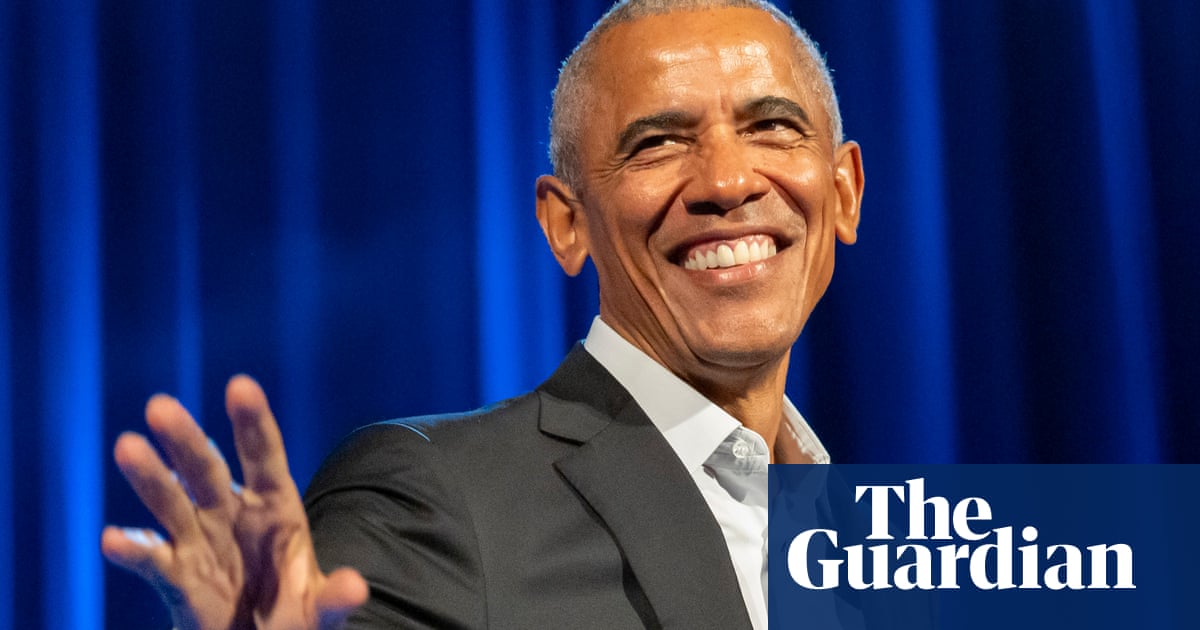From “skinny kid with a funny name” to elder statesman: Barack Obama, the former US president, will be the headline speaker at the Democratic national convention in Chicago on Tuesday – 20 years after he first burst onto the national political scene.
Obama, a state legislator from Illinois, was days from his 43rd birthday and months from being elected to the Senate when he was given a slot at the party’s 2004 convention in Boston. “Rising star to woo voters with upbeat keynote speech,” was the Guardian headline on 27 July 2004.
Obama brought Democrats to their feet with a plea for hope and unity. Two decades later, America is more divided than ever, but on Tuesday the first Black president, back in his home city, will make the case for party nominee Kamala Harris to become the first woman and first woman of colour to win election to the White House.
“The president will talk again in personal terms about what it takes to be president in this moment and what he’s prepared to do and that this is an all-hands-on-deck moment, where we all have to get involved,” Valerie Jarrett, a former senior adviser to Obama, said at an Axios House event in Chicago on Tuesday.
“One of the lessons we certainly should have learned: it’s not just enough to elect a president. You also have to stay engaged throughout the term of your presidency. Sometimes you elect a president and you go, OK, I’m done, and you go back to your jobs, and that’s not the way democracies work.”
Michelle Obama, the former first lady, who is popular enough in her own right that some Democrats floated her as an alternative to Joe Biden, will be speaking on Tuesday night as well.
Jarrett, chief executive of the Obama Foundation, added: “Our democracy has been under threat and under attack and it is up to us to be those active and engaged citizens to ensure that we get back on track. I think that’s part of the message you’ll hear from both of them tonight. So be there or be square.”
Back in July 2004, in a 16-minute speech, Obama framed the presidential election, talked up nominee John Kerry and told his origin story as the son of a Black man from Kenya and a white woman from Kansas. He told delegates: “Let’s face it, my presence on this stage is pretty unlikely.”
Obama did not dwell on policy, but his sweeping indictment of divisive politics struck a chord. “There is not a liberal America and a conservative America – there is the United States of America,” he said. “There is not a Black America and a white America and Latino America and Asian America – there’s the United States of America. Do we participate in a politics of cynicism or do we participate in a politics of hope?”
Joel Rubin, a Democratic strategist, recalled: “It was such a wonderful moment. It was an inspiring moment. It was like a moment to feel truly patriotic and proud to be part of a political party that wanted to bring back the country together. It spoke to the power of our country as a unified people.”
Two and a half years later, Obama reprised that theme when he launched his presidential campaign before thousands of supporters gathered outside the Illinois capital of Springfield. His campaign motto was “hope and change”.
Yet the flipside of hope was fear, an emotion that Republican Donald Trump was able to exploit to win the White House in 2016. After eight toxic years, the young Obama’s dream of a genuinely united nation seems as elusive as ever.
Rubin, a former Obama administration deputy assistant secretary of state, added: “He diagnosed the problem in America right now. One speech never fixes a country. It’s part of a process.
after newsletter promotion
“What you do is you elect leaders who have a commitment to that kind of vision and, unfortunately, we regressed in 2016 because we had Donald Trump come in committed to the opposite vision by not healing but destroying and magnifying difference rather than unity. But the message for the Democratic convention today is similar to the Obama message of unity and forward purpose.”
“The historic nature of this convention is not lost on any of us, but especially those of us who grew up in the civil rights movement,” said Rev Al Sharpton. “Last night, we felt the clear through-line from Fannie Lou Hamer in 1964, Shirley Chisholm in 1972, Rev Jesse Jackson in the 1980s, and Barack Obama in 2008.”
“I think that will be felt as much when Obama takes the stage here in his hometown. I cannot help but think of when I ran for president in 2004 and met briefly with him before each of us spoke. It was clear that night that he struck a tone with the nation – one that still resonates with many of us 20 years later.”
On Tuesday, Obama will also honour the legacy of Joe Biden, who served eight years as Obama’s vice-president. Biden will not be in the hall to see his former running mate speak, as he departed Chicago after delivering his own speech.
Media reports suggest that Biden is still needled by the role that Obama – along with party leaders Nancy Pelosi, Hakeem Jeffries and Chuck Schumer – played in pressuring the 81-year-old to not seek re-election due to concerns over his mental capacity.
Schumer, the Democratic majority leader in the Senate, told a CNN-Politico Grill event on Monday: “I’m not going to give my private conversations with the former president. That’s up to him to decide. But we had a number of serious discussions.”

